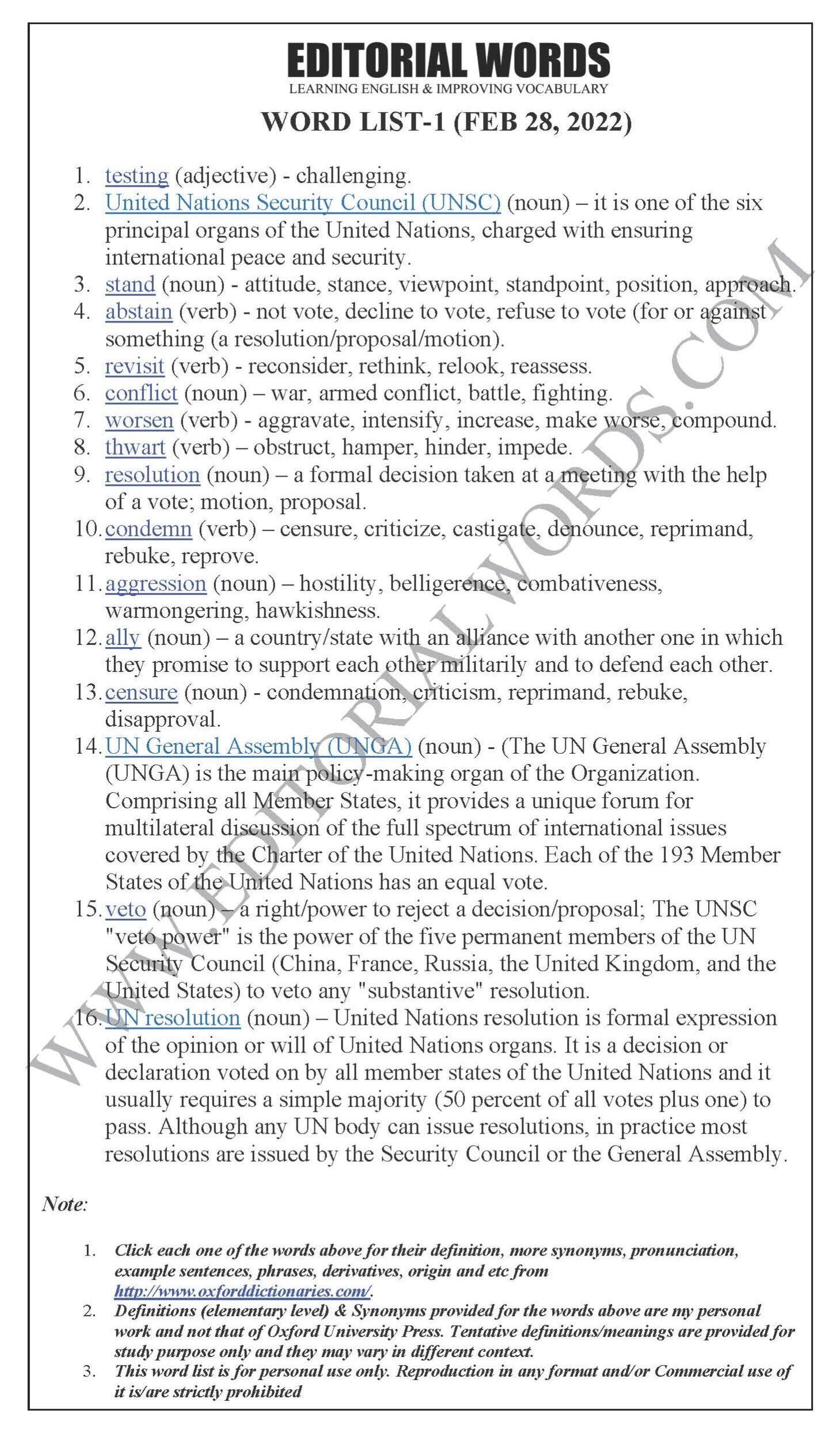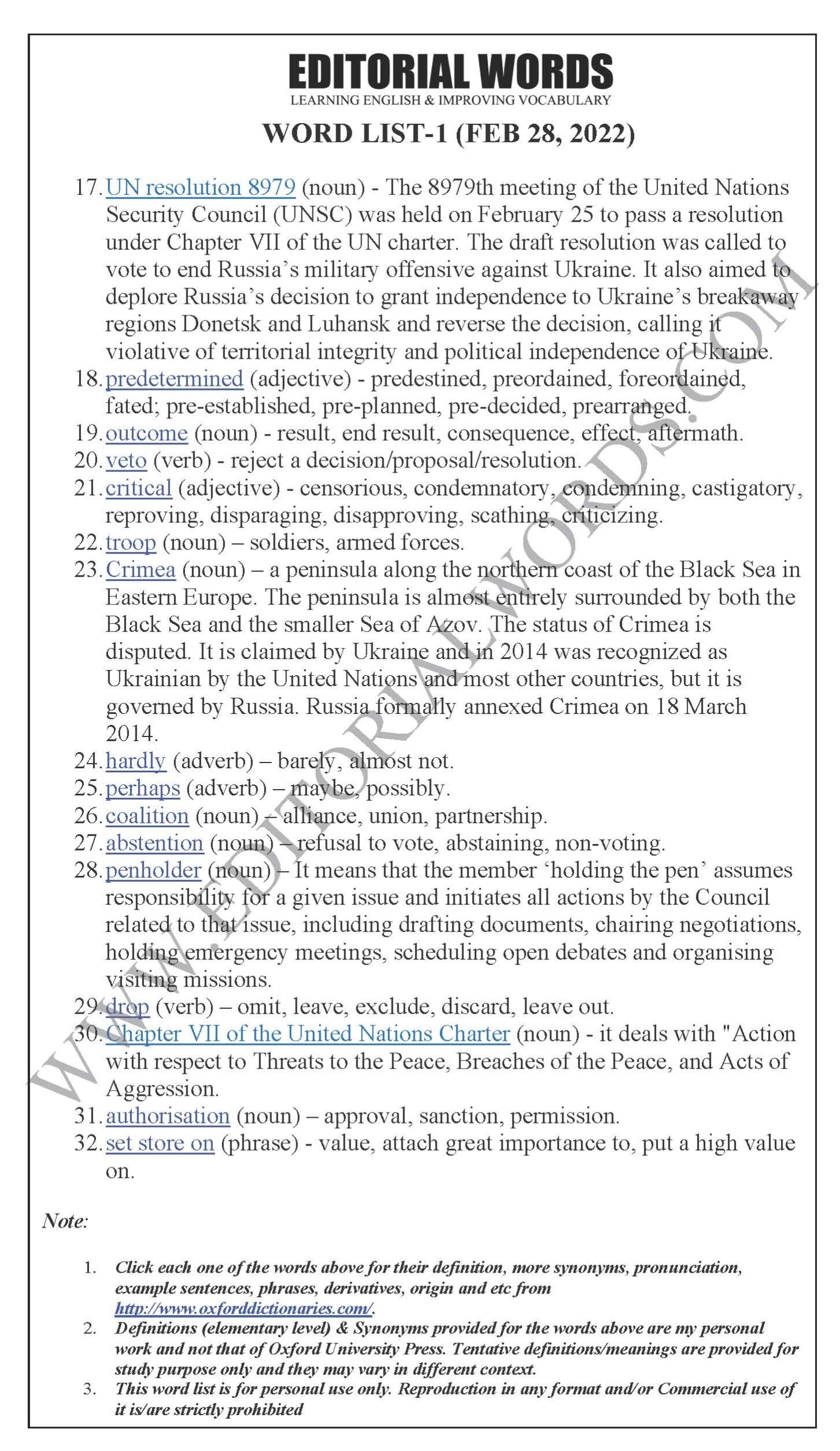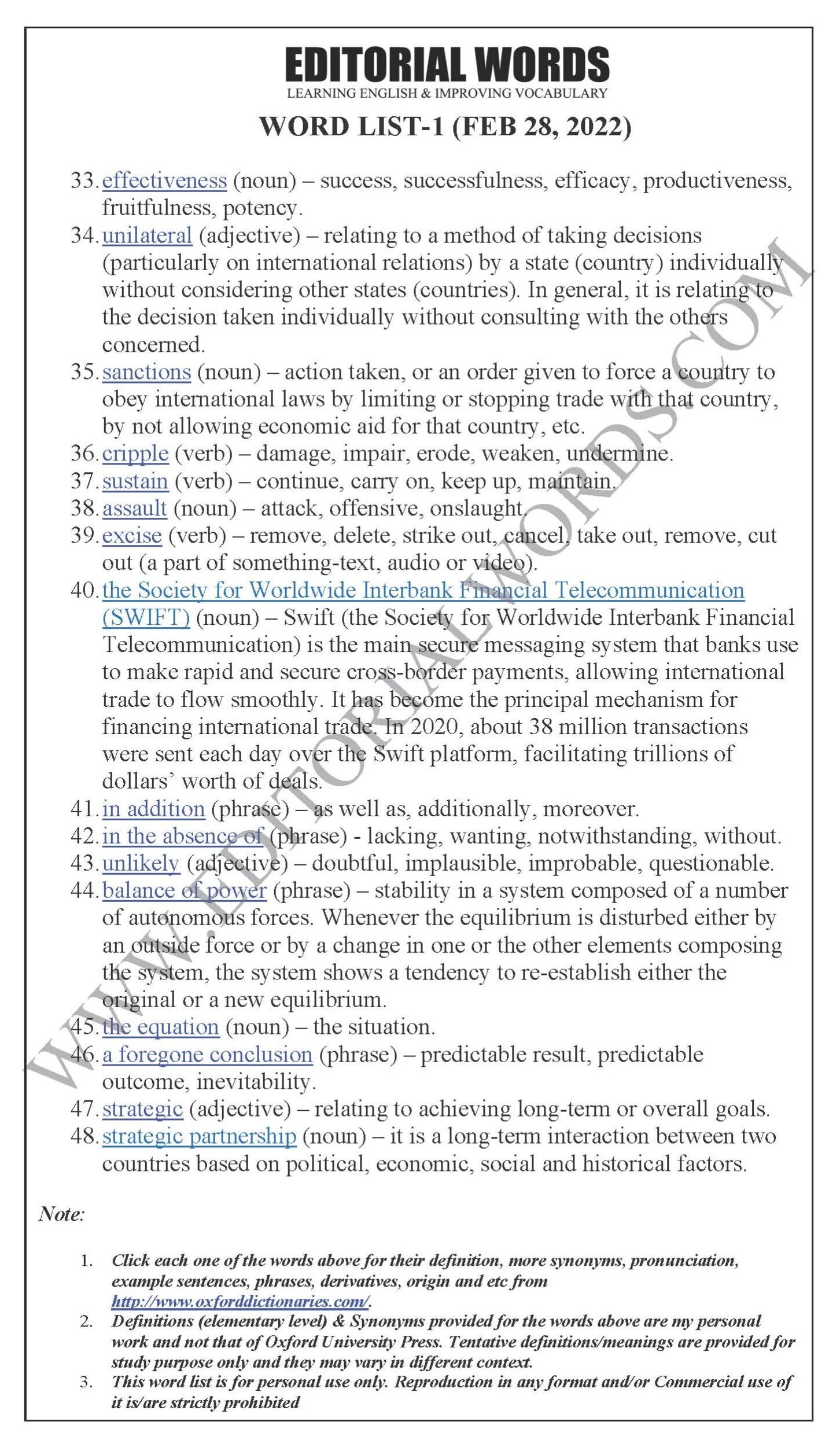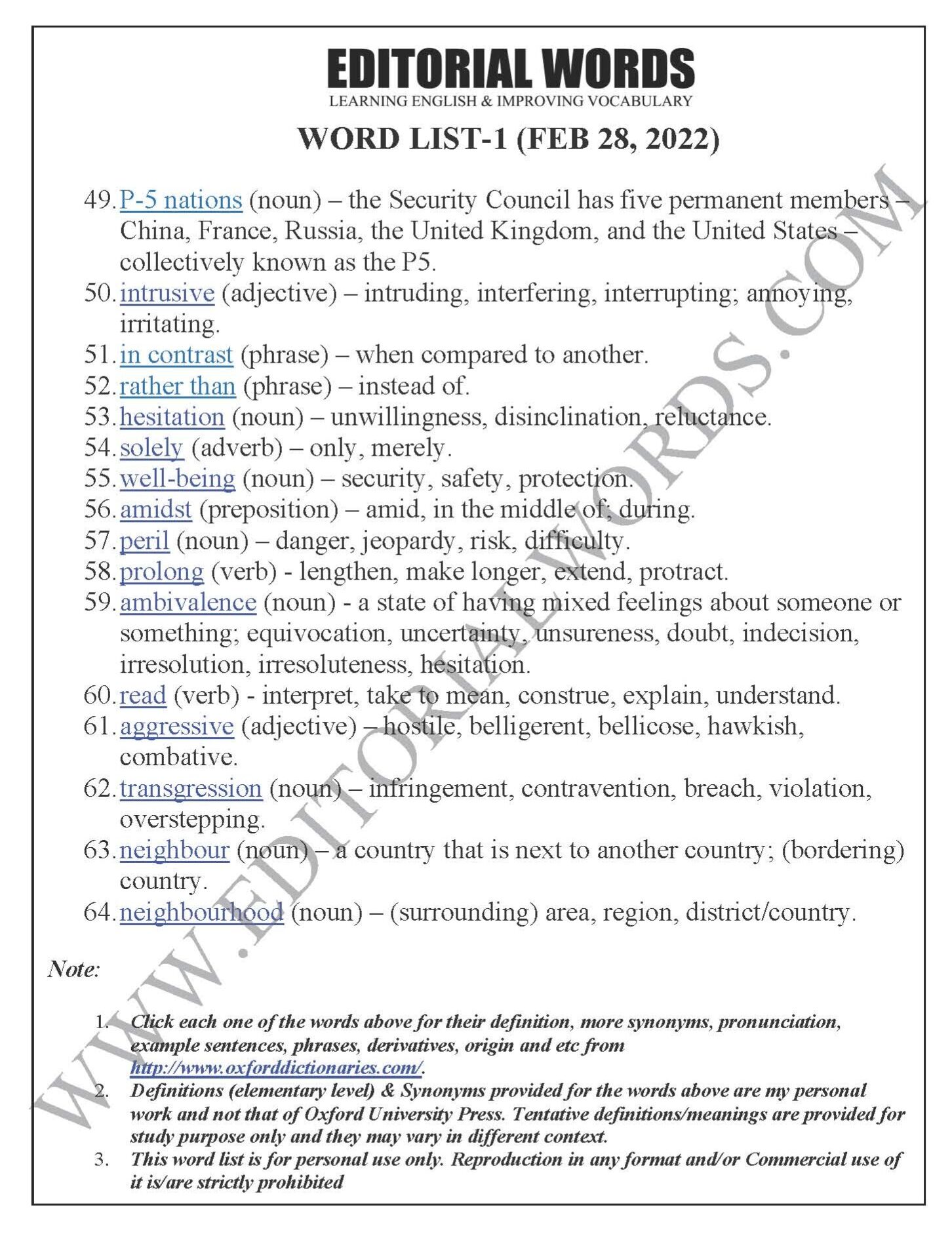The Hindu Editorial (A testing vote) – Feb 28, 2022
Thwarted at the UN Security Council in their resolution to condemn Russian aggression on Ukraine, the U.S. and European allies now plan to ensure a censure of Moscow’s actions at the UN General Assembly,… For further reading, visit “The Hindu”. Below is today’s word list-1 for The Hindu Editorial (A testing vote) – Feb 28, 2022.
To read this article, click “The Hindu”.
This preview is provided here with permission.
Courtesy: The Hindu
The Hindu Editorial (A testing vote) – Feb 28, 2022:
- testing (adjective) – challenging.
- United Nations Security Council (UNSC) (noun) – it is one of the six principal organs of the United Nations, charged with ensuring international peace and security.
- stand (noun) – attitude, stance, viewpoint, standpoint, position, approach.
- abstain (verb) – not vote, decline to vote, refuse to vote (for or against something (a resolution/proposal/motion).
- revisit (verb) – reconsider, rethink, relook, reassess.
- conflict (noun) – war, armed conflict, battle, fighting.
- worsen (verb) – aggravate, intensify, increase, make worse, compound.
- thwart (verb) – obstruct, hamper, hinder, impede.
- resolution (noun) – a formal decision taken at a meeting with the help of a vote; motion, proposal.
- condemn (verb) – censure, criticize, castigate, denounce, reprimand, rebuke, reprove.
- aggression (noun) – hostility, belligerence, combativeness, warmongering, hawkishness.
- ally (noun) – a country/state with an alliance with another one in which they promise to support each other militarily and to defend each other.
- censure (noun) – condemnation, criticism, reprimand, rebuke, disapproval.
- UN General Assembly (UNGA) (noun) – (The UN General Assembly (UNGA) is the main policy-making organ of the Organization. Comprising all Member States, it provides a unique forum for multilateral discussion of the full spectrum of international issues covered by the Charter of the United Nations. Each of the 193 Member States of the United Nations has an equal vote.
- veto (noun) – a right/power to reject a decision/proposal; The UNSC “veto power” is the power of the five permanent members of the UN Security Council (China, France, Russia, the United Kingdom, and the United States) to veto any “substantive” resolution.
- UN resolution (noun) – United Nations resolution is formal expression of the opinion or will of United Nations organs. It is a decision or declaration voted on by all member states of the United Nations and it usually requires a simple majority (50 percent of all votes plus one) to pass. Although any UN body can issue resolutions, in practice most resolutions are issued by the Security Council or the General Assembly.
- UN resolution 8979 (noun) – The 8979th meeting of the United Nations Security Council (UNSC) was held on February 25 to pass a resolution under Chapter VII of the UN charter. The draft resolution was called to vote to end Russia’s military offensive against Ukraine. It also aimed to deplore Russia’s decision to grant independence to Ukraine’s breakaway regions Donetsk and Luhansk and reverse the decision, calling it violative of territorial integrity and political independence of Ukraine.
- predetermined (adjective) – predestined, preordained, foreordained, fated; pre-established, pre-planned, pre-decided, prearranged.
- outcome (noun) – result, end result, consequence, effect, aftermath.
- veto (verb) – reject a decision/proposal/resolution.
- critical (adjective) – censorious, condemnatory, condemning, castigatory, reproving, disparaging, disapproving, scathing, criticizing.
- troop (noun) – soldiers, armed forces.
- Crimea (noun) – a peninsula along the northern coast of the Black Sea in Eastern Europe. The peninsula is almost entirely surrounded by both the Black Sea and the smaller Sea of Azov. The status of Crimea is disputed. It is claimed by Ukraine and in 2014 was recognized as Ukrainian by the United Nations and most other countries, but it is governed by Russia. Russia formally annexed Crimea on 18 March 2014.
- hardly (adverb) – barely, almost not.
- perhaps (adverb) – maybe, possibly.
- coalition (noun) – alliance, union, partnership.
- abstention (noun) – refusal to vote, abstaining, non-voting.
- penholder (noun) – It means that the member ‘holding the pen’ assumes responsibility for a given issue and initiates all actions by the Council related to that issue, including drafting documents, chairing negotiations, holding emergency meetings, scheduling open debates and organising visiting missions.
- drop (verb) – omit, leave, exclude, discard, leave out.
- Chapter VII of the United Nations Charter (noun) – it deals with “Action with respect to Threats to the Peace, Breaches of the Peace, and Acts of Aggression.
- authorisation (noun) – approval, sanction, permission.
- set store on (phrase) – value, attach great importance to, put a high value on.
- effectiveness (noun) – success, successfulness, efficacy, productiveness, fruitfulness, potency.
- unilateral (adjective) – relating to a method of taking decisions (particularly on international relations) by a state (country) individually without considering other states (countries). In general, it is relating to the decision taken individually without consulting with the others concerned.
- sanctions (noun) – action taken, or an order given to force a country to obey international laws by limiting or stopping trade with that country, by not allowing economic aid for that country, etc (Courtesy: VOA Learning English).
- cripple (verb) – damage, impair, erode, weaken, undermine.
- sustain (verb) – continue, carry on, keep up, maintain.
- assault (noun) – attack, offensive, onslaught.
- excise (verb) – remove, delete, strike out, cancel, take out, remove, cut out (a part of something-text, audio or video).
- the Society for Worldwide Interbank Financial Telecommunication (SWIFT) (noun) – Swift (the Society for Worldwide Interbank Financial Telecommunication) is the main secure messaging system that banks use to make rapid and secure cross-border payments, allowing international trade to flow smoothly. It has become the principal mechanism for financing international trade. In 2020, about 38 million transactions were sent each day over the Swift platform, facilitating trillions of dollars’ worth of deals.
- in addition (phrase) – as well as, additionally, moreover.
- in the absence of (phrase) – lacking, wanting, notwithstanding, without.
- unlikely (adjective) – doubtful, implausible, improbable, questionable.
- balance of power (phrase) – stability in a system composed of a number of autonomous forces. Whenever the equilibrium is disturbed either by an outside force or by a change in one or the other elements composing
the system, the system shows a tendency to re-establish either the original or a new equilibrium. - the equation (noun) – the situation.
- a foregone conclusion (phrase) – predictable result, predictable outcome, inevitability.
- strategic (adjective) – relating to achieving long-term or overall goals.
- strategic partnership (noun) – it is a long-term interaction between two countries based on political, economic, social and historical factors (Courtesy: IDSA (Institute for Defence Studies and Analyses)).
- P-5 nations (noun) – the Security Council has five permanent members – China, France, Russia, the United Kingdom, and the United States – collectively known as the P5.
- intrusive (adjective) – intruding, interfering, interrupting; annoying, irritating.
- in contrast (phrase) – when compared to another.
- rather than (phrase) – instead of.
- hesitation (noun) – unwillingness, disinclination, reluctance.
- solely (adverb) – only, merely.
- well-being (noun) – security, safety, protection.
- amidst (preposition) – amid, in the middle of; during.
- peril (noun) – danger, jeopardy, risk, difficulty.
- prolong (verb) – lengthen, make longer, extend, protract.
- ambivalence (noun) – a state of having mixed feelings about someone or something; equivocation, uncertainty, unsureness, doubt, indecision, irresolution, irresoluteness, hesitation.
- read (verb) – interpret, take to mean, construe, explain, understand.
- aggressive (adjective) – hostile, belligerent, bellicose, hawkish, combative.
- transgression (noun) – infringement, contravention, breach, violation, overstepping.
- neighbour (noun) – a country that is next to another country; (bordering) country.
- neighbourhood (noun) – (surrounding) area, region, district/country.
Note:
1. Click each one of the words above for their definition, more synonyms, pronunciation, example sentences, phrases, derivatives, origin and etc from http://www.oxforddictionaries.com/.
2. Definitions (elementary level) & Synonyms provided for the words above are my personal work and not that of Oxford University Press. Tentative definitions/meanings are provided for study purpose only and they may vary in a different context.
3. This word list is for personal use only. Reproduction in any format and/or Commercial use of it is/are strictly prohibited.
The Hindu Editorial (A testing vote) – Feb 28, 2022:




“Phrasal Verbs” We Learnt Last Week
“Idioms & Phrases” We Learnt Last Week
“Important Definitions” We Learnt Last Week
Recent Word Lists For The Hindu Editorial Articles

Be the first to comment